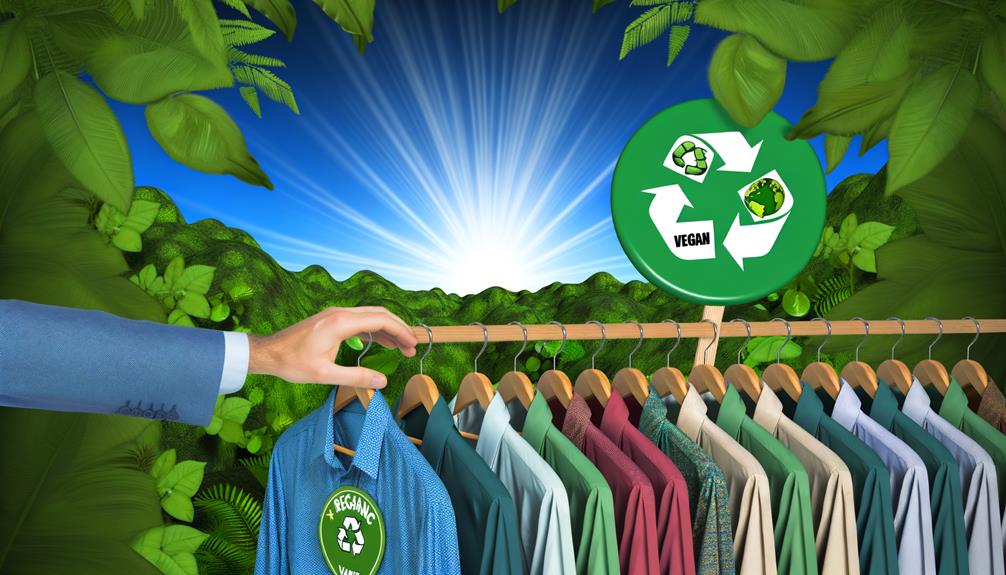As you navigate the world of fashion, choosing eco-friendly, cruelty-free apparel can often feel like searching for a needle in a haystack. You’re faced with the challenge of decoding labels and understanding the complex journey your clothing takes from production to hanger. It’s not just about looking good; it’s about feeling good ethically and contributing to a sustainable future. You’ll want to steer clear of materials that come at the cost of animal welfare and environmental degradation, such as leather, wool, and fur, opting instead for innovative plant-based and recycled alternatives. But where do you start, and how can you be sure that your choices truly align with your values of compassion and sustainability? The key lies in becoming well-informed about the fabrics, the certification labels, and the ethos behind the brands you choose to support. As you embark on this journey to curate a wardrobe that reflects both your style and your commitment to the planet, you’ll discover there’s more to fashion than meets the eye.
Key Takeaways
- Vegan materials offer an animal-free alternative to traditional materials, such as leather and fur.
- Look for the PETA-Approved Vegan label or other vegan certifications to ensure items are devoid of animal-derived components.
- Support sustainable fashion brands that align with vegan values and prioritize ethical and sustainable practices.
- Choose eco-friendly fabric options and look for certifications and labels like Global Organic Textile Standard (GOTS) and Fair Trade Certified to ensure environmentally friendly and cruelty-free apparel.
Understanding Vegan Materials
When you dive into the world of vegan materials, you’re not only sidestepping the cruelty involved in traditional animal-derived fabrics, but you’re also embracing a more sustainable and compassionate fashion culture. You become part of the vegan fashion revolution, where every choice in your wardrobe reflects your commitment to ethics and the environment.
Vegan leather, for instance, offers an animal-free alternative to the traditional leather sourced from cows or pigs. This innovative material is part of a growing selection of cruelty-free materials that are kinder to our planet. By choosing vegan clothing, you support a system that avoids the environmental destruction inherent in the production of animal skins and exotic leathers.
Moreover, opting for Faux fur instead of real fur means you’re rejecting the tremendous suffering endured by foxes and rabbits for fashion. The PETA-Approved Vegan label on clothing and accessories ensures that you’re selecting items devoid of animal-derived components, including wool, silk, and down feathers, which often involve distressing practices.
Embrace sustainable materials that don’t compromise the well-being of animals. Wear Vegan features in your daily ensembles to demonstrate a culture of care and responsibility. Together, we’re crafting a future where fashion is synonymous with fairness and compassion.
Identifying Cruelty-Free Labels
Navigating the world of eco-friendly fashion, you’ll often find yourself searching for the reliable assurance of cruelty-free labels on your apparel. Identifying cruelty-free labels is key to ensuring that your wardrobe aligns with your commitment to animal rights and ethical fashion.
Here’s how you can ensure your choices reflect a culture of compassion:
- Look for the PETA-Approved Vegan logo or other vegan certifications that denote animal-free clothing.
- Research brands that are known for ethical and sustainable practices, often highlighted in articles about sustainable clothing.
- Read reviews and feedback from other consumers who prioritize vegan products and ethical apparel.
- Reach out directly to companies to inquire about their use of recycled materials and cruelty-free policies.
Choosing cruelty-free clothing isn’t just about avoiding animal harm; it’s about embracing an ethical and sustainable lifestyle where every purchase supports a future that values all life. When you opt for a vegan brand, you’re not only making a statement about animal rights, but also contributing to a market that treasures ethical and sustainable production. By identifying cruelty-free labels, you’re joining a movement that dresses with purpose and serves the greater good, ensuring your fashion choices leave a positive footprint on the world.
Sustainable Fashion Brands
Having established the importance of cruelty-free labels, it’s equally vital to support sustainable fashion brands that align with these values and innovate with plant-based materials. When you’re selecting your wardrobe, look for vegan options that forgo traditional animal products. Brands like Stella McCartney lead the charge, offering luxurious alternatives to leather using microfibers and recycled materials, setting a high bar for ethical brands.
Embrace cruelty-free clothing by choosing vegan shearling and opting for cozy sweaters made from twill, cotton, or recycled polyester, rather than wool. This sustainable choice honors the creatures with whom we share our world and reduces environmental impact. For those chilly days, faux fur provides the warmth and style you seek without compromising your values, as many leading brands have eliminated real fur from their collections.
Silk-free alternatives, like nylon and polyester, offer a similar touch of elegance and are often endorsed by the PETA-Approved Vegan logo, making it easier for you to make compassionate and sustainable choices. Moreover, trailblazers like Brave GentleMan are utilizing materials such as hemp and recycled rubber to craft exemplary cruelty-free pieces.
In essence, as you dedicate yourself to serving others, extend that care to all living beings by supporting sustainable fashion brands that prioritize ethics as much as aesthetics.
Maintaining Vegan Wardrobe
To maintain a vegan wardrobe, it’s crucial to consciously select animal-free leather alternatives and other cruelty-free materials that reflect a commitment to ethical fashion. Sustainable fashion isn’t just a trend; it’s a lifestyle that honors the planet and its inhabitants. As you nurture your wardrobe, consider these key components:
- Look for clothing and accessory items that bear the PETA-Approved Vegan logo, ensuring they’re free from animal-derived materials.
- Choose clothing companies like WAMA Underwear, which provide silk-free underwear, and opt for natural materials that don’t compromise on comfort or style.
- Embrace recycled products to minimize waste, and find cruelty-free options that help reduce the industry’s carbon footprint.
- Educate yourself on vegan features to learn more about innovative alternatives like bio-fabricated leather and plant-based dyes.
Leanne Mai-ly Hilgart, a pioneer in compassionate fashion, has shown that style doesn’t have to suffer for ethics. By following her example and others in the movement, you can curate a wardrobe that aligns with your values. Remember, every garment is a statement about the world you want to live in. Serve others and the planet by choosing vegan, and let your closet be a testament to your dedication to kindness and sustainability.
Shopping Green and Ethical
When you shop for new clothes, choosing green and ethical brands that champion vegan materials can make a significant impact on animal welfare and the environment. Sustainable fashion isn’t just a trend; it’s a movement towards preserving our planet and respecting all living beings. By opting for fashion brands that utilize recycled products and organic cotton, you’re saying no to animal products that often come from cruel fur farms and have a hefty carbon footprint.
Your choices help promote an environmentally friendly culture where supply chains are transparent, and toxic chemicals are left out of the equation. This is not just about you; it’s about serving a greater good — preserving the diversity of our world for future generations. Look for the PETA-Approved Vegan Logo to easily spot items that share your compassionate values.
Furthermore, consider the ethical practices behind cruelty-free brands. Do they align with your principles? Reach out to them, ask questions, and become a conscious consumer. Sustainable clothing and eco-friendly shoe brands like Harvest & Mill and Native Shoes mirror your commitment to an earth-friendly lifestyle by offering alternatives to leather and silk that don’t sacrifice quality or style. Remember, every green and ethical choice you make sends a powerful message of change.
Frequently Asked Questions
How Do You Choose a Sustainable Clothing Brand?
To choose a sustainable clothing brand, you’ve got to scrutinize their supply chain for ethical sourcing, shun greenwashing, and demand transparency. Support local production that upholds fair trade and lessens your carbon footprint.
How Do You Know if Clothes Are Eco-Friendly?
You’ll know clothes are eco-friendly by checking for organic cotton, recycled polyester, and biodegradable materials, ensuring low water usage and carbon footprint. Look for ethical labor practices and certifications to avoid greenwashing.
What Fabrics Are Opposed by Peta?
PETA opposes materials that pull the wool over your eyes regarding animal welfare: leather, exotic skins, fur, silk, down, and certain wools. They champion PETA-approved, plant-based alternatives that respect our fellow earthlings.
Are Vegan Clothes Eco-Friendly?
Yes, vegan clothes can be eco-friendly, with responsible material sourcing reducing your carbon footprint, less water usage, and avoiding harmful chemical dyes. Look for vegan certification and recycling potential to ensure ethical fashion choices.







